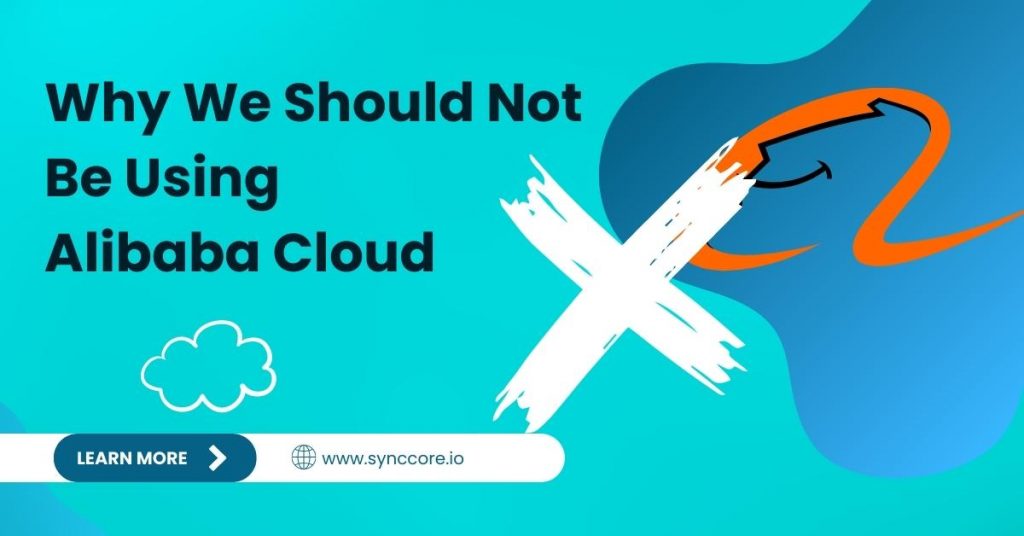Why We Should Not Be Using Alibaba Cloud: Cloud computing is a game-changing technology that provides on-demand availability of computer system resources from any location, particularly data storage and computing functions, without the user’s direct and active management. The computer system and its machinery, i.e., relevant hardware, software, and their combination, are stored in a virtual rather than physical space.
Instead of storing the data locally, the data, as well as the software and hardware required to run the necessary programs, are stored in the cloud and can be accessed remotely as long as you are connected to the internet, emulating the functions of a physical computer seamlessly. It is handy and beneficial for modern-day working because it increases security, improves work efficiency, and increases productivity.
Table of Contents
Why We Should Not Be Using Alibaba Cloud

Alibaba Cloud
The “big three” cloud service providers, namely Google Cloud Platform (GCP), Amazon Web Services (AWS), and Microsoft Azure, continue to dominate the global cloud hosting market, as is well known. However, they are not the only ones. Alibaba Cloud is one of the most critical emerging players and, without a doubt, the largest cloud computing service provider in China and Asia.
Alibaba Cloud is an Alibaba Group subsidiary that has been providing cloud computing services and specialized AI technology since its inception in 2009. However, Alibaba Cloud did not begin to expand globally until a one billion dollar investment was made in 2015. Alibaba Cloud’s international operations are registered and headquartered in Singapore, with 24 data centers spread across 74 locations.
Now, Alibaba provides cloud computing and virtualization services to many government agencies and departments, companies, businesses, and developers worldwide. Alibaba Cloud has a firm grip on the Chinese and small markets in East Asia. Following the pandemic, there has been an exponential increase in demand for cloud-based services in Western countries and developing Asia Pacific countries.
Despite Alibaba’s consistent growth, it is doubtful that Alibaba Cloud will take over Amazon Web Services, the market’s largest service provider. Alibaba Cloud is offering a 12-month free trial to attract more customers, and they have recently increased their investment in advertisements outside of China. They have their e-magazine to attract businesses and build trust by showcasing Alibaba’s success story. Alibaba’s rise in this field dramatically benefits China’s ever-expanding economy.
Choosing Alibaba Cloud: What will you get?
There is no doubt that Alibaba Cloud provides many services comparable to Amazon Web Services and Microsoft Azure. Elastic Compute, also known as ECS (Elastic Computing Service) and EC2 (Elastic Cloud Compute), as well as Data Storage, Big-Data Processing, Relational Databases, Anti-DDoS security, and Content Delivery Networks (CDNs), are pay-as-you-go cloud services provided by the Alibaba Cloud.
Alibaba Cloud allows you to store data in a variety of formats, including Storage Area Network (SAN), Fibre Channel (FC) storage, and Network File System (NFS), which offers high speed and a centralized backup system.
What are the disadvantages of Alibaba Cloud?
Despite having cutting-edge technologies, relevant facilities, competitive and pay-as-you-go pricing, and international reach, Alibaba has certain disadvantages that should make you reconsider if you are looking for an online cloud service. The disadvantages of Alibaba Cloud will be discussed in the following article.
- A comparatively new player in the cloud market
Although Alibaba Cloud has been in the cloud computing and virtualization market for some time, it is still a new player compared to Amazon or Google. Alibaba Cloud has spent the majority of its time in and around China. As a result, it lacks a thorough understanding of the Western market, making it an unsuitable choice for large-scale operations and global MNCs.
- Issues with Compliance and Standard Protocol
Your data is stored in various locations around the world by Alibaba Cloud. There have been several allegations of data siphoning without proper user consent. It is untrustworthy when storing sensitive data, which is a valuable asset for a developer, business, or individual. Its failure to adhere to international standards and protocols is cause for concern.
Furthermore, according to feedback from Azure and Huawei users, the user interface of Alibaba Cloud is not as smooth as the other two. Other market options would be preferable for new users or those who prefer the ease of access.
- Data Security and Privacy Concerns
China has been involved in shady data storage, security, and privacy practices. In China, there have been allegations of data manipulation, spyware, malware, trojans, and other unethical methods for personal gain. A recent example is Red Echo, a China-based hacker group that targeted Mumbai’s critical infrastructure in 2020, resulting in multiple power outages across the city.
Because almost everything in China is state-controlled, business owners have little freedom and autonomy. Alibaba Cloud is a subsidiary of the Alibaba group, headquartered in China. Although their international operations are registered in Singapore, their data grids are located throughout China, making sensitive data more accessible to the Chinese government.
Ali Baba cloud has a data security policy, but it is insufficient because the country it is based has no transparency in its operations. Alibaba Cloud is not the best host if you do not want your data to be mishandled, mismanaged, or accessed without authorization. Other cloud computing service providers in Western countries offer better data security and protection.
- Inefficient Customer Service
As previously stated, Alibaba Cloud is a relatively new player. Customer service in international languages, as well as English, is insufficient. Customers frequently struggle to reach and communicate with customer service representatives, most of whom are Chinese. Customers are frustrated because basic customer service is not prompt and smooth enough. You cannot afford to wait a long time for a response from their team.
- Opaque functioning
Data and information are the most valuable assets of the twenty-first century, and having a transparent policy is the first and most crucial requirement for protecting your data. Before you choose a cloud hosting service and virtual machine, you must trust the service provider with whom you will entrust your sensitive data. China and its companies are not known for their transparency policies and are frequently accused of being Bing opaque in their operations.
Despite going through the contract clause by clause and word by word, you may overlook minor flaws in the privacy policy or the long and tedious contract terms and conditions. It is critical to recognize that your virtual asset is just as important as your physical asset. It would help if you were cautious about where you place your investments.
Conclusion
Although Alibaba Cloud is a less expensive option with all of the necessary features, the disadvantages of this cloud hosting service provider cannot be overlooked.
SyncCore is a far better alternative to Alibaba cloud. If you require cloud services, please contact us at [email protected] or visit our website at www.synccore.io.
Read More:
Google Cloud vs. Alibaba Cloud Provider Feature Comparisons
Cloud Pricing Comparison: AWS vs. Azure vs. Google Cloud vs. SyncCore



